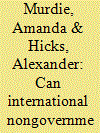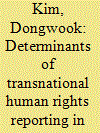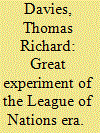|
|
|
Sort Order |
|
|
|
Items / Page
|
|
|
|
|
|
|
| Srl | Item |
| 1 |
ID:
123623


|
|
|
|
|
| Publication |
2013.
|
| Summary/Abstract |
Nonstate actors, such as international non-governmental organizations (INGOs) and multinational corporations (MNCs), have attained an increasingly prominent role in modern world affairs. While previous research has focused on these actors' respective interactions with states, little attention has been paid to their interactions with each other. In this paper, we examine the extent to which the decisions of private actors seeking to invest abroad are affected by the reputational costs of doing business in countries publicly targeted by human rights activists. We find that ''naming and shaming'' by human rights INGOs tends to reduce the amount of foreign direct investment received by developing states, providing evidence that INGO activities affect the behavior of MNCs. An additional implication of our findings is that shaming by INGOs can impose real costs on targeted states in the form of lost investment.
|
|
|
|
|
|
|
|
|
|
|
|
|
|
|
|
| 2 |
ID:
123017


|
|
|
|
|
| Publication |
2013.
|
| Summary/Abstract |
Do international nongovernmental organizations (INGOs) lessen the need for states to provide their own services? In the case of health, many assume that INGOs limit health spending by governments. Against the conventional wisdom, we argue that these organizations create increased demand for governmental health spending through three mechanisms: (1) indirectly affecting the policy-making climate ("climatic conditioning"), (2) aiding domestic NGO and health activists in their efforts, and (3) directly pressuring governments for increased health spending themselves. Given these mechanisms, health INGOs, although typically supplying health services of their own within a country, should augment pressure for public service provision by the state and, it follows, lead to increased state health spending. We test our argument using a new data set on health INGOs, together with a well-established model of health spending, and find ample support for our arguments. Increases in health INGOs' activities do lead to increased governmental health spending, mainly by indirectly affecting the policy-making climate and, most especially, advancing the effective efforts of domestic activists.
|
|
|
|
|
|
|
|
|
|
|
|
|
|
|
|
| 3 |
ID:
160633


|
|
|
|
|
| Summary/Abstract |
Why do some national governments in East and Southeast Asia receive more transnational scrutiny and pressure on their domestic human rights practices than others? This article argues that transnational human rights reporting is more likely to target states where domestic activists and victims are densely connected with human rights international nongovernmental organizations (INGOs) through a local membership base. Human rights INGOs increase social demands and opportunities for transnational human rights reporting by strengthening local actors’ capabilities to leverage human rights and international solidarity as an advocacy strategy, and by mobilizing them for monitoring and information collection on the ground. Event count analyses of 25 Asian states from 1977 to 2008 find robust support for the theory, using new data on Amnesty International's human rights reporting and human rights INGOs’ local membership base, and controlling for government respect for human rights, regime type, military power, and other factors.
|
|
|
|
|
|
|
|
|
|
|
|
|
|
|
|
| 4 |
ID:
117796


|
|
|
|
|
| Publication |
2012.
|
| Summary/Abstract |
This article aims to shed historical light on the contemporary debate concerning the role of international nongovernmental organizations and intergovernmental organizations in the democratization of global governance through an assessment of the experience and political thought of the League of Nations era. After introducing the interactions of international nongovernmental organizations and intergovernmental organizations in the present day and in the League of Nations period and the contemporary debate on their role in the democratization of global governance, the article discusses how democracy in global governance was conceived in the League of Nations era, with particular reference to the work of Alfred Zimmern. The analysis highlights not only the considerable continuities between interwar thought and that of the present day, but also the potential problems identified at the time that remain pertinent today.
|
|
|
|
|
|
|
|
|
|
|
|
|
|
|
|
|
|
|
|
|